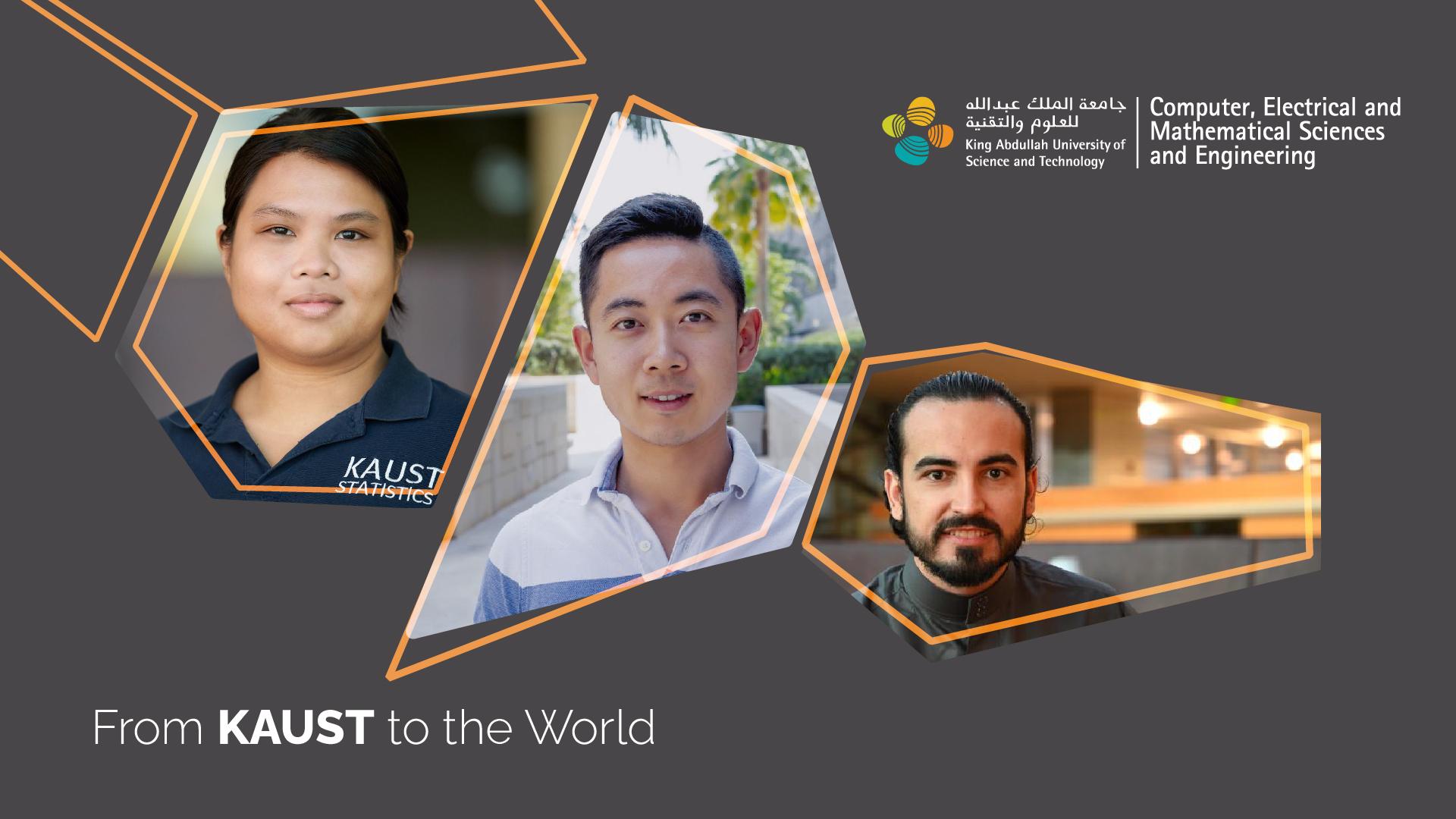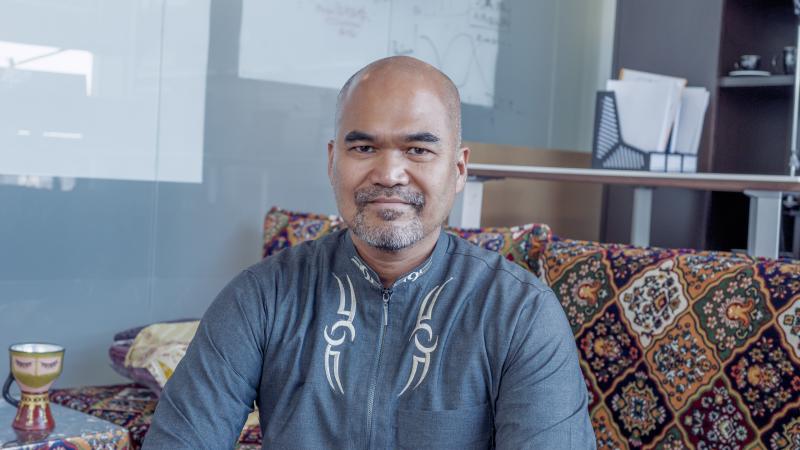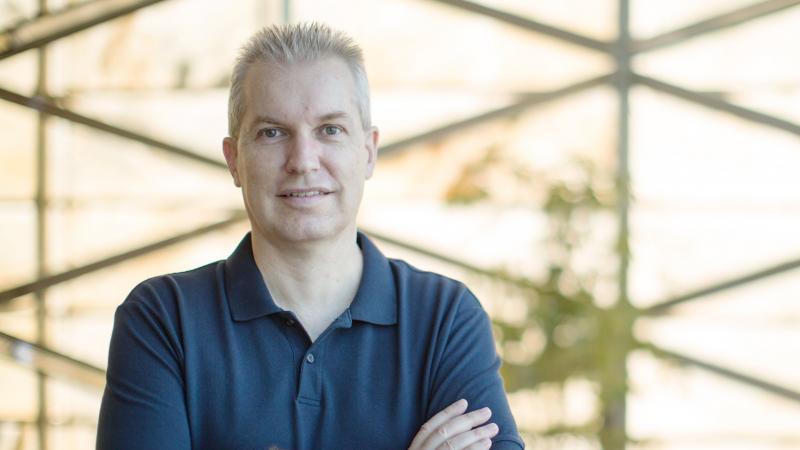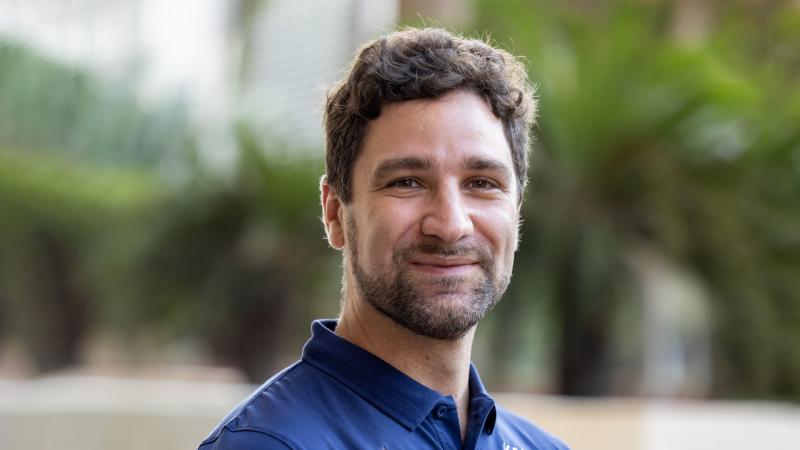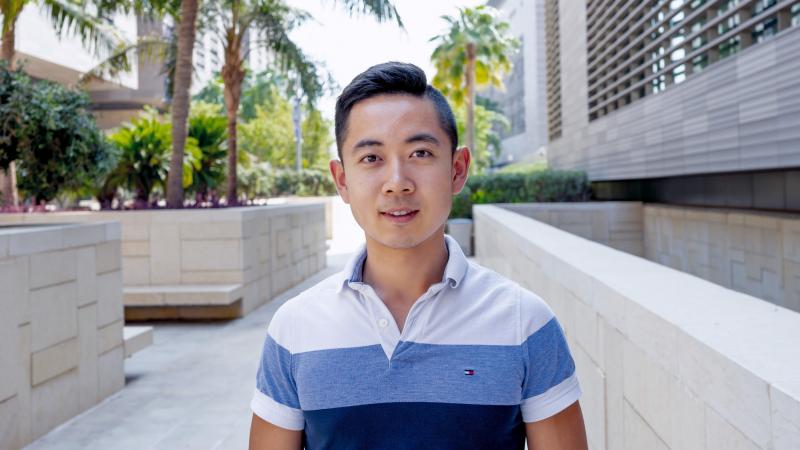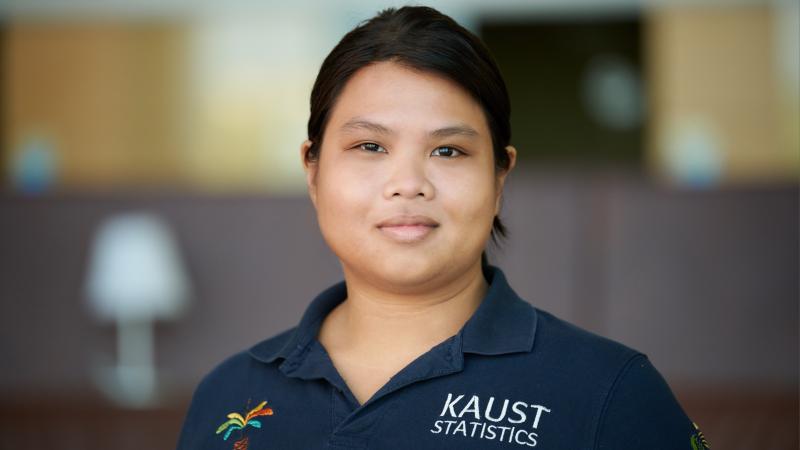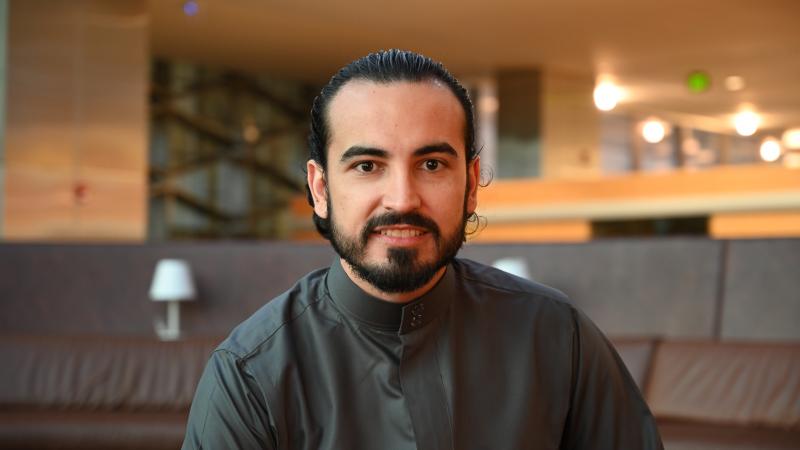By David Murphy
KAUST graduates are characterized by the rigor of their Ph.D. programs, the long hours spent in the lab and classroom, juggling professional and personal commitments, achieving a work-life balance and, more recently, the ability to adapt to a global pandemic.
Many CEMSE Division alums leave KAUST each year to take up notable positions in renowned companies, universities and research laboratories within the Kingdom and around the world.
For three recent Ph.D. graduates, KAUST has symbolized a transformative moment in their collective lives: it has launched their academic careers, promoted new approaches to science and technology, and helped them become better scientists and individuals.
The three graduates—Jian Cao, Matheus Bartolo Guerrero and Mary Lai Salvaña—have been appointed to faculty positions at prominent U.S. universities, thus becoming the first KAUST Statistics (STAT) program graduates to achieve this feat.
Cao and Salvaña (KAUST PI: Professor Marc Genton) and Guerrero (co-advised by Professor Raphaël Huser and Professor Hernando Ombao) will take up assistant professorships at the University of Houston (UH), the University of Connecticut (UConn), and California State University Fullerton (CSUF), respectively.
CEMSE News recently spoke with the three researchers about their time at KAUST, their research, the future of statistics, and what they hope to bring to their new roles in the United States.
Jian Cao
Cao is currently working as a postdoctoral fellow with Dr. Matthias Katzfuss at Texas A&M University, U.S. He received his bachelor’s degree ('14) in mathematics at the University of Science and Technology of China and his master’s at Shanghai Jiao Tong University, China. In June 2020, Cao obtained his Ph.D. ('20) in statistics at KAUST, supervised by KAUST Distinguished Professor of Statistics Marc Genton.
The focus of Cao’s research is computational statistics, specifically spatial statistics. Moving forward, he intends to combine computational methods with real-world applications in order to gain a deeper understanding of modeling.
“Joining KAUST was a turning point in my life. KAUST set me up for an academic career, specifically developing a prudent attitude toward research, thinking scientifically, conducting literature research and building my research on top of existing results. It also provided a well-diversified cultural environment, which also promoted my curiosity about interacting with other cultures.
“More importantly, KAUST allowed me to explore what I vaguely thought would be my career interest, build up the skills I desired, and form a clear picture of my plan for the future. Without this experience, I would probably be wandering between jobs that I may not enjoy as much.”
Matheus Bartolo Guerrero
Prior to pursuing his Ph.D. in statistics at KAUST, Guerrero earned his M.S. ('18) in Statistics from the Universidade Federal de Minas Gerais, Brazil. His educational background includes B.S. degrees in mathematics ('08) and statistics ('14) from the Universidade Federal de Uberlândia, Brazil.
His current research bridges time series and extreme value theory. It also focuses on developing realistic statistical models based on multi-channel electroencephalogram data for brain connectivity in epileptic patients.
“The need for a better understanding of such a complex neurological disorder as epilepsy is urgent, especially regarding how information flows in the brain network during a seizure. To this end, I aim to develop a rigorous set of tools and models helpful to neuroscientists as they study brain connectivity in epilepsy and other neurological diseases.”
At this stage in his career, the Brazilian researcher’s primary goal is to become an effective instructor and mentor dedicated to empowering the next generation of students. Guerrero is driven to help his students develop into statisticians, data scientists, researchers and scholars who dream big, pursue their goals with determination and persist through challenges.
As a result of securing a faculty position at CSUF, he is filled with a profound sense of accomplishment and appreciation, as well as a sense of responsibility and anticipation about the challenges ahead.
“I fully recognize the weight of carrying KAUST’s name and the expectation to excel in my new role. This awareness fuels my motivation and fear of failure, reminding me of the importance of staying grounded and focused on continuous growth and improvement.
“Exposure to interdisciplinary research and entrepreneurial activities at KAUST has instilled in me the importance of collaboration. It has enabled me to hone my teamwork, project management and communication skills. These skills will be crucial in mentoring students and promoting interdisciplinary research in my new position.”
Mary Lai Salvaña
Mary Lai Salvaña is currently a postdoctoral researcher at the University of Houston, U.S. At UH, she is working alongside Professor Mikyoung Jun to develop statistical models for multivariate three-dimensional spatial environmental phenomena.
Mary Salvaña received her bachelor’s and master’s degrees in applied mathematics at the Ateneo de Manila University, Philippines, in 2015 and 2016, respectively. Her doctoral work at KAUST focused on constructing physics-motivated space-time covariance functions. Under the supervision of Professor Marc Genton, she obtained her Ph.D. in statistics in June 2021.
At UConn, Mary Salvaña aims to develop three branches of research that will address global problems stemming from climate change: extreme events modelling, risk modelling and cascading disasters modelling.
“I am interested in tackling frontier problems like understanding risks associated with climate change and designing resilience in societies worldwide. I want to answer questions like: ‘Can we predict the impact of the next super typhoon or hurricane?’ ‘Can communities recover while anticipating another wave of extreme weather events?’”
Furthermore, Mary Salvaña contends that the systems and infrastructures built to deal with disaster events such as fires, floods, and droughts are becoming obsolete due to the new normal of extreme climate events.
“Right now, we are still facing significant gaps in predicting the frequency, severity, risk, and impacts of disasters. This is because climate change is now outpacing climate models. Nowadays, the weather we have prepared for is not the weather we are getting.”
“Statistics is the best tool we have right now to understand these highly significant and impactful events under a changing climate. My research will provide state-of-the-art statistics models to help advance climate science and shape our awareness of future disaster chains.”
“With everyone worried about ‘unforeseen’ climate events and the terrible damage they cause, universities need to have research in this critically important field. This is exciting new work that I feel very passionate about.”
While the KAUST STAT program molded Mary Salvaña to become a statistician capable of pursuing these emerging research areas, her motivation for exploring such research areas stems from a deeply personal experience: On December 16, 2011, Tropical Storm Washi, known in the Philippines as Tropical Storm Sendong, wreaked havoc in Mary Salvaña’s hometown of Cagayan de Oro City.
The storm destroyed her family home and displaced Mary Salvaña and her family for half a year. Following the storm, they were temporarily relocated to a local evacuation center, where they slept on a cold, hard floor and relied on the government for food and clothing. They spent Christmas and New Year’s Eve of 2011 in the hospital as Mary Salvaña’s father contracted leptospirosis from the floodwaters.
“Two weeks later, we returned to our family home to check if there were some things that could be salvaged from the ruins. I cried when I saw my bedroom; I could not recognize the place: no more clothes, books or photo albums … 12 years' worth of memories gone as if I was never there.”
The trauma of Washi led Mary Salvaña to join Ateneo Innovation Center (AIC), a nonprofit research organization based at Ateneo de Manila University, Philippines. “At AIC, professors, students, researchers and industry and government partners collaborate on addressing problems regarding clean water, food security, energy access, universal health care and disaster risk management in the Philippines.”
The KAUST STAT program
The KAUST STAT program equips students with the knowledge and skills to analyze and model complex real-world problems arising in modern statistical data science. The program offers conceptual and practical frameworks to devise scientific investigations, model real phenomena, predict events and quantify uncertainty from an unprecedented amount of data.
A unanimous feeling among the three graduates is that the STAT program and their mentors at KAUST have had a lasting impact on them academically and professionally.
“My time at KAUST has equipped me with diverse knowledge and skills that will be invaluable in my new role at CSUF,” Guerrero emphasized.
“As I move forward in my academic career, I will cherish the memories of KAUST: the unique opportunities it provided, the exceptional network of colleagues and friends I have built here, and the exposure to the many diverse and rich cultures. I believe that KAUST offers an unparalleled experience for those ready to embrace its possibilities,” he added.
“Being part of the KAUST STAT program made me feel like I am part of a network of great statisticians and researchers worldwide,” Mary Salvaña noted. “Day in and day out, I saw students and faculty working in the lab with great purpose, which motivated me to do great research.
“Through my weekly research meetings with my adviser, Professor Marc Genton, I learned a lot about statistics and academia. I will never forget a particular piece of advice he gave me that I still follow today: ‘Reviewers will find a reason to reject your paper. So, try to submit the most perfect paper you could write.’ This was because the first-ever manuscript I sent him to check was full of grammatical errors. Until this day, I write my papers with Professor Genton’s soundbite replaying in my head,” she added
“I am thankful for the environment KAUST provided and Dr. Genton's advice. UH marks the start of an exciting chapter in my career, and I hope to carry on the reputation of the KAUST STAT program to further success,” Cao concluded.
